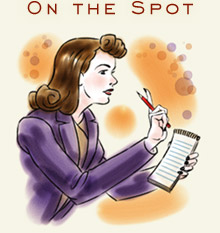Emdashes—Modern Times Between the Lines
The Basics:
About Emdashes | Email us
Ask the Librarians
Best of Emdashes: Hit Parade
A Web Comic: The Wavy Rule
Features & Columns:
Headline Shooter
On the Spot
Looked Into
Sempé Fi: Cover Art
Lewis and Glass: Parsing the Crooks and the Fools
Filed under: On the Spot Tagged: 92Y, economics, events, Ira Glass, journalism, Michael Burry, Michael Lewis, Steve Eisman

Martin Schneider writes:
A rash assertion: Ira Glass and Michael Lewis are the two best people in the world at discussing the recent financial collapse in front of a lay audience.
Glass is host and producer of This American Life and works often with (and helped found) the "Planet Money" podcast. Lewis's first book, Liar's Poker, was about the bond market and Salomon Brothers, and his most recent bestseller, The Big Short, is about the dysfunctional real estate market of the George W. Bush years. These men have both spent countless hours figuring out just the right way to express to regular, informed non-experts what went so catastrophically wrong on Wall Street a few years back.
On February 3 they appeared together at 92Y.
The event was not boring. Actually, it was fairly riveting.
Glass was interviewing Lewis on this night, and he assumed the role of the people's staunch advocate. He frequently expressed a desire to "get" those responsible for the crisis; Lewis was a bit more cagey about embracing that populism. This divide tells us, I think, a lot about the two men's styles in general.
Glass is a middle-class constructive aspirer, and his work and personality reflect that in a more or less uncomplicated way. Lewis, for his part, may have hobnobbed with too many wealthy people in his life to be fully in sync with Glass on a number of issues, but it's precisely that protean quality of his charm that may lie at the root of Lewis's greatness as a reporter. Lewis worked as a bond salesman for several years, remember, and knows a lot more billionaires than the average muckraker. He's not your typical left-wing slacker genius—but that slacker genius also could not have written Lewis's books.
The dialogue at 92Y was primarily about two things, Lewis's approach to reporting, and who was responsible for the financial collapse. Lewis was modest to a fault, calling himself "lazy" and indeed, elevating a certain kind of laziness as a key to his success: "I'm lazy.... I don't want to spend time with people I don't like."
Glass quizzed Lewis about the problem of making a story like The Big Short readable. The formal problem of writing The Big Short is that the heroes of the book made billions of dollars on the collapse of the U.S. financial system, not normally a quality that endears a person to readers. (Lewis: "They bought fire insurance on your house and then watched it burn down.") Glass asked if Lewis had "tricked" his readers into liking characters like Michael Burry and Steve Eisman, the two most memorable "shorters" in the book (Eisman was in the audience at 92Y). Lewis demurred: "Well, that's the point—I really like them!"
Lewis addressed a dichotomy that comes up in the books, that of the difference between the "fools" and the "crooks." In effect, per Lewis, the financial collapse was the result of a toxic combination of obliviousness and venality, and it's not clear which of those is worse: "Wall Street can withstand the charge that they are behaving in societally unproductive ways. They can't withstand the charge that they are actually stupid, bad with money."
The longish session had too much to quote from, so I'll stop now. It was a terrific event, and I was very happy to be in attendance. And also, I do recommend The Big Short (and This American Life too, duh).




Comments
Great recap. Though I still want to know why Lewis likes Burry and Eisman so much. What irresistible qualities do they possess? Perhaps I need to read the book…
Well, definitely read the book. Burry and Eisman are quite different types, both presented as abrasive (for different reasons) but also profoundly interested in the market reflecting reality, which wasn’t happening for much of that period (bad loans taken out by people with no income not causing bonds predicated on those loans to suffer in value etc.). Lewis positions them (and a few other guys) as the only people on Wall Street who were neither “crooks” nor “fools.” It only occurs to me now that they’re a lot like Billy Beane, actually. You do root for them to succeed, especially Burry, but you also learn that success for them doesn’t look the way they thought it would—money, sure, but not much satisfaction aside from that.